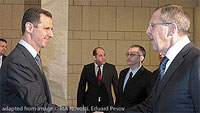Putin Seizes on Syria to Cement Russia Middle East Sway

(Bloomberg – bloomberg.com – Henry Meyer – September 11, 2013) Vladimir Putin is seizing the chance to keep Russia’s foothold in the Middle East.
President Barack Obama yesterday postponed a decision on military action in Syria after Putin proposed to put Syria’s chemical weapons under international control, shifting the global debate. It allows Putin to keep a role in molding the fate of an ally of more than 40 years that hosts Russia’s only military base outside the former Soviet Union and raise his country’s international status.
“Putin’s goal is to play for time, to push off the talk of strikes for as long as possible because the longer he pushes them off, the less likely they are,” said Philippe Moreau-Defarges of the French Institute of International Relations in Paris. “Hats off to the Russians, those guys are master diplomats. Putin and Assad have totally won this round.”
Since coming to power 13 years ago, Putin, who’s called the collapse of the Soviet Union a “catastrophe,” has worked to restore Russia as a global power and halt the advance of western interests at his country’s expense.
In Syria, Putin has focused on negotiations over sanctions or military intervention after Russia lost its allies in the region as a result of the overthrow of Saddam Hussein in Iraq in 2003 and Muammar Qaddafi in Libya in 2011.
Russia’s Role
Putin, the main patron of Syrian President Bashar al-Assad, is presenting himself as a defender of international law. The Russian leader contests U.S. claims that government forces carried out an Aug. 21 chemical attack that killed more than 1,400 people near Damascus and insists that any punitive strike without UN approval would be illegal.
Obama, who struggled to build Congressional support for an assault on Syria, postponed a decision on military strikes, saying yesterday he would pursue Russia’s proposal to have Syria surrender its stockpiles of chemical weapons to international authorities.
“It’s too early to tell whether this offer will succeed, and any agreement must verify that the Assad regime keeps its commitments,” Obama said in remarks from the East Room of the White House. The initiative “has the potential to remove the threat of chemical weapons without the use of force, particularly because Russia is one of Assad’s strongest allies.”
No Force
The plan only makes sense if the U.S. “and other nations supporting it tell us that they’re giving up their plan to use force against Syria,” Putin said, according to a statement on the Kremlin’s website yesterday.
France, Germany, the U.K. and Japan welcomed Russia’s initiative with caveats. U.K. Foreign Secretary William Hague said the “onus is on Russia and Syria to show that this is credible.”
France proposed a UN Security Council resolution demanding that Syria place its chemical arms under international control and calling for Assad to be punished for carrying out the chemical attack. The French proposal isn’t acceptable, the Russian Foreign Ministry said, adding that the country will submit its own draft.
Russian Ambassador to Paris Alexander Orlov said on France Inter radio today that he thinks the Syrian government is “perfectly sincere” in its willingness to cooperate. While a refusal by Assad’s regime should trigger talks on sanctions, France’s demand is too hasty, he said.
‘Diplomatic Coup’
Secretary of State John Kerry will meet with his Russian counterpart Sergei Lavrov tomorrow in Geneva to discuss Russia’s initiative.
Russia and China, veto-wielding council members along with the U.S., U.K. and France, have repeatedly blocked UN action against Assad over a 2 1/2-year civil war that has killed more than 100,000 people.
“If Russia’s proposal stops the U.S. from conducting war, it will be a major diplomatic coup,” Alexander Rahr, a Russian analyst at the German-Russian Forum who wrote a biography of Putin, said by phone from Berlin yesterday.
Even if the Russian proposal is sincere, logistical challenges may make it difficult to execute.
Locating all of Syria’s hidden and constantly moving chemical weapons would be difficult in the middle of a civil war, said one U.S. official familiar with the issue, citing the long and fruitless search in Iraq for the chemical and biological weapons that the administration of President George W. Bush said Saddam Hussein had hidden.
‘Save Face’
Still, if Putin does win UN backing for the plan, it may lead to peace talks sponsored by Russia and the U.S. that may enable Assad’s Alawite minority to keep some control over the country, according to Fyodor Lukyanov, head of the Moscow-based Council on Foreign and Defense Policy.
During the Group of 20 summit that Putin hosted in his hometown of St. Petersburg last week, Russia announced Syrian Foreign Minister Walid al-Muallem would visit Moscow for talks Sept. 9, the last day of Kerry’s trip to Europe to drum up support for an attack. Lavrov and Muallem unveiled their plan just hours after the top U.S. diplomat told reporters in London that Assad could avoid intervention by quickly handing over “every single bit” of Syria’s chemical arsenal.
“America is now able to save face and avoid major problems because an attack on Syria would harm its own interests” by encouraging Islamic radicals, said Sergei Karaganov, dean of the world economy and politics faculty at the Higher School of Economics in Moscow.
U.S. public opinion is running increasingly against attacking Syria. A Pew Research Center-USA Today poll found the proportion of Americans against it grew to 63 percent from 48 percent over the past week. The heightened opposition was across party lines in the survey, which was conducted Sept. 4-8.
“It’s a win-win situation for Russia, Syria and the U.S.,” said Lukyanov. “Everyone gets something out of it. But for the Syrian opposition, it’s a catastrophe.”
